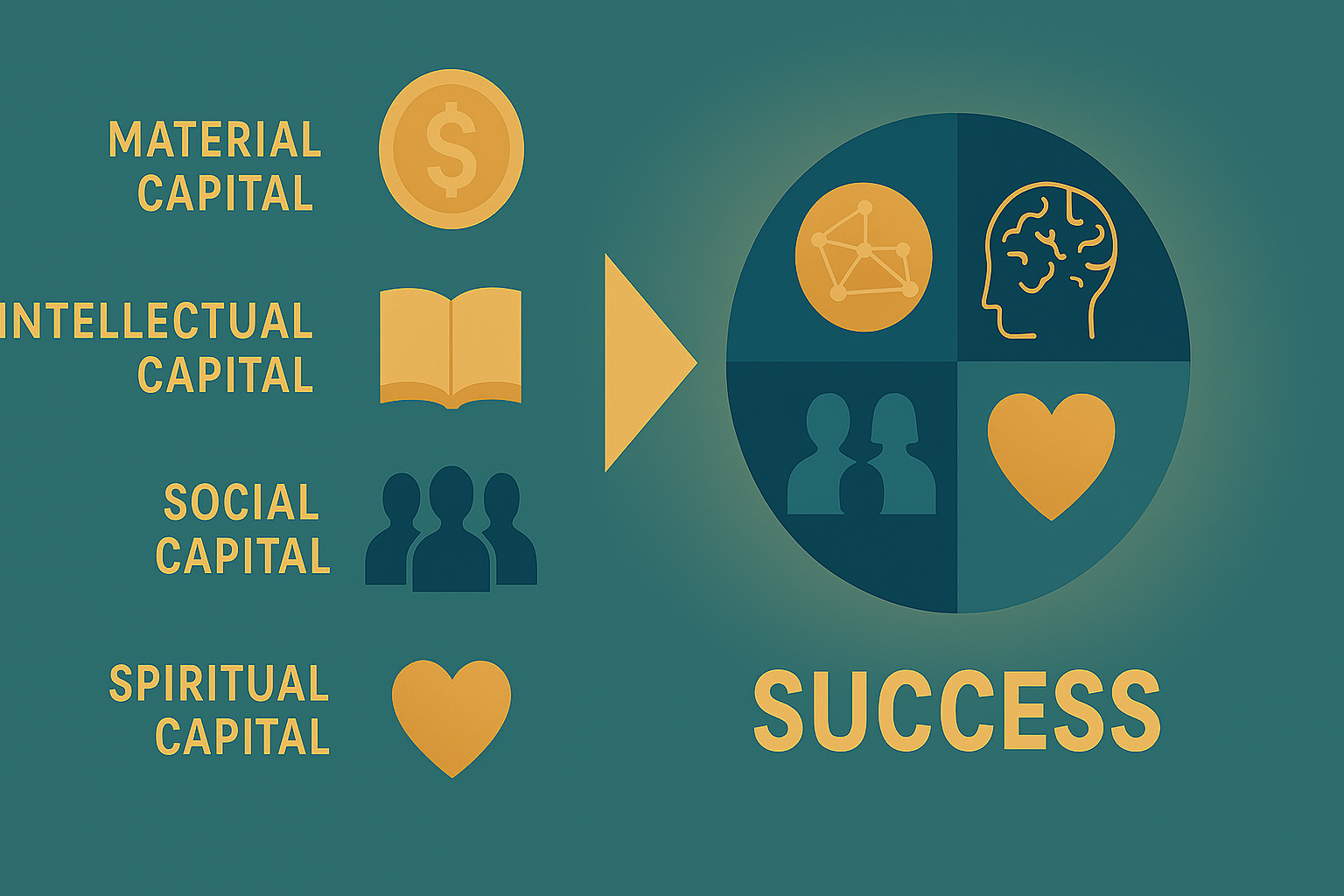 4Capital transformation
is a practical shift toward
balanced development
across material,
intellectual,
social, and
spiritual
capitals. It recognizes that lasting performance and well-being
require all four capitals to grow together—not one at the
expense of the others.
4Capital transformation
is a practical shift toward
balanced development
across material,
intellectual,
social, and
spiritual
capitals. It recognizes that lasting performance and well-being
require all four capitals to grow together—not one at the
expense of the others.
Background: The imbalance and
its consequences
For a long
time, material capital (money, equipment, infrastructure) and
intellectual capital (knowledge, skills, innovation) received
most of the attention. Social capital (trust, networks,
reciprocity) and spiritual capital (purpose, values, meaning)
were often undervalued. The result can be ethical lapses, weak
community ties, burnout, short-termism, and fragile systems—even
when resources and ideas appear abundant.
The impact of 4Capital
transformation
A 4Capital
transformation recognizes and nurtures all four capitals at
once. Benefits include:
•
Enhanced ethics and
integrity: spiritual capital anchors decisions in
purpose and moral standards, building trust.
• Stronger well-being
and cohesion: social capital reduces isolation,
improves cooperation, and supports mental health.
• Sustainable success:
balanced growth avoids short-term gains that create long-term
harm.
•
Innovation with
guidance: intellectual capital drives new ideas while
the other capitals ensure constructive use and adoption.
• Resilience:
diversified strengths help individuals and organizations adapt
to shocks and change.
How to begin (simple,
non-technical)
•
See clearly:
name your strengths and constraints in each capital (one page
per capital).
•
Balance, don’t
maximize: invest in the weakest capital first; look for
complements
(e.g., pair tools with training; pair policies with
relationships; pair budgets with purpose).
• Make it visible:
turn values into routines (rituals, norms, simple promises) and
knowledge into shareable practices (guides, checklists).
• Maintain what
matters: keep material assets reliable; keep knowledge
fresh; keep relationships healthy; keep purpose present.
•
Review regularly: brief check-ins (monthly, quarterly,
annually) to see what improved and what needs attention.
Everyday examples (brief)
• A clinic balances
equipment reliability (material),
shared care playbooks
(intellectual), team
huddles and patient councils (social), and a
dignity-first pledge
(spiritual). Quality rises and burnout falls.
• A small business pairs
cash discipline
(material) with
training and SOPs (intellectual),
local partnerships
(social), and a
service-centered mission (spiritual). Customer loyalty
strengthens.
• A city
aligns
infrastructure upkeep (material),
open data and learning
(intellectual),
neighborhood co-design (social), and a
public integrity
charter (spiritual). Programs gain adoption and
legitimacy.
Safeguards
• Avoid one-sided
growth: overinvestment in any single capital can create
new risks.
•
Protect fairness and
inclusion: strong ties should not become exclusionary;
bridging ties matter.
•
Be transparent:
explain choices and trade-offs; keep promises.
• Respect privacy and
conscience: observe and measure capitals in ways that
are voluntary and respectful.
Conclusion
4Capital transformation is an essential shift for achieving
optimal performance
and well-being in a complex world. By developing
material, intellectual, social, and spiritual capitals in
balance, people and organizations gain ethical grounding,
cooperative strength, creative power, and durable capacity.
Success is then measured not only in material gains, but in the
richness of human experience and the quality of our shared life.